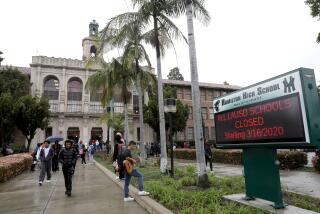Purchase of Classrooms Broke Law, Audit Says
Los Angeles school officials violated state law and ignored district policies while buying more than 300 portable classrooms last year, according to an internal audit released Thursday.
The review found that employees in the facilities services division sidestepped competitive bidding procedures amid a frantic effort to create space for class-size reduction.
Staff members also disregarded repeated warnings about installing the bungalow classrooms without purchase orders or the approval of the Board of Education, creating the possibility of excessive spending and lawsuits, the review said.
The audit was conducted by Don Mullinax, the school district’s new director of internal audits and special investigations.
District employees insist that legal procedures were followed.
“At no time were we trying to circumvent any laws or any district policies,” said Al Bowen, who is in charge of buying portable classrooms for the district. “It was all in an effort to serve students.”
State law allows districts to forgo competitive bidding if school boards have unanimously approved “emergency exemptions.” Such exemptions can be issued when repairs or alterations at schools are necessary for classes to continue.
District employees acted without getting this exemption, the audit says. They also failed to obtain prior purchase orders for the bungalows, which cost a total of $824,000 for the first 102. (The audit did not give a total for the other bungalows.) Instead, the facilities division issued letters of intent to manufacturers, and purchase orders were generally prepared after the classrooms were installed, according to the audit.
The review said this method of buying portables continued despite warnings from various corners of the district.
The purchasing branch, for example, informed the facilities staff on four occasions in early 1998 that its practice “was contrary to policy, was not good business practice and could be illegal,” the audit says.
The district’s controller also directed the division to discontinue its methods. And the chief administrative officer informed Beth Louragand, at that time the general manager of the facilities division, that the method of acquiring bungalows “would be considered poor business practices in any environment.”
Because of such dealings, officials had “minimal assurance” that they received the best prices on the bungalows, and the purchasing method placed the district at risk of lawsuits and set a poor example for other district managers, according to the audit.
The facilities division bought its portables by “piggybacking” on the bungalow contracts of other districts, a common and legal practice meant to speed up acquisition. Those contracts were competitively bid, leading Bowen and other facilities employees to maintain that their efforts were within the law.
The district’s attorney defended the purchasing practice, saying employees complied with competitive bidding laws even if the purchasing process was not followed step by step.
“There were no instances where a letter of intent was issued and the buildings were received and installed before a purchase order was issued,” Bowen said, disputing the audit’s findings.
He added that he doesn’t recall warnings about the purchasing practice, and Louragand told auditors that questions were never raised. But some top officials believe the facilities division didn’t follow guidelines.
“While it appears that district staff were well-intentioned in seeking to expedite the delivery and installation of portable classrooms to provide facilities for class size reduction efforts, the audit underscores how staff did not follow the normal acquisition process,” said chief administrative officer David Koch, who requested the audit.
Louragand was replaced last week as general manager of the division, and now works as the director of strategic financial planning for the district. She declined to comment on the findings.
Last year, she was removed as head of the management team that heads up the Proposition BB school repair work after clashing with the head of the oversight committee.
Some district officials said they believe Louragand is now being punished for following the mandates of her bosses, who wanted to keep students off buses and quickly reduce class sizes after the popular program was introduced in 1996.
More to Read
Sign up for Essential California
The most important California stories and recommendations in your inbox every morning.
You may occasionally receive promotional content from the Los Angeles Times.










